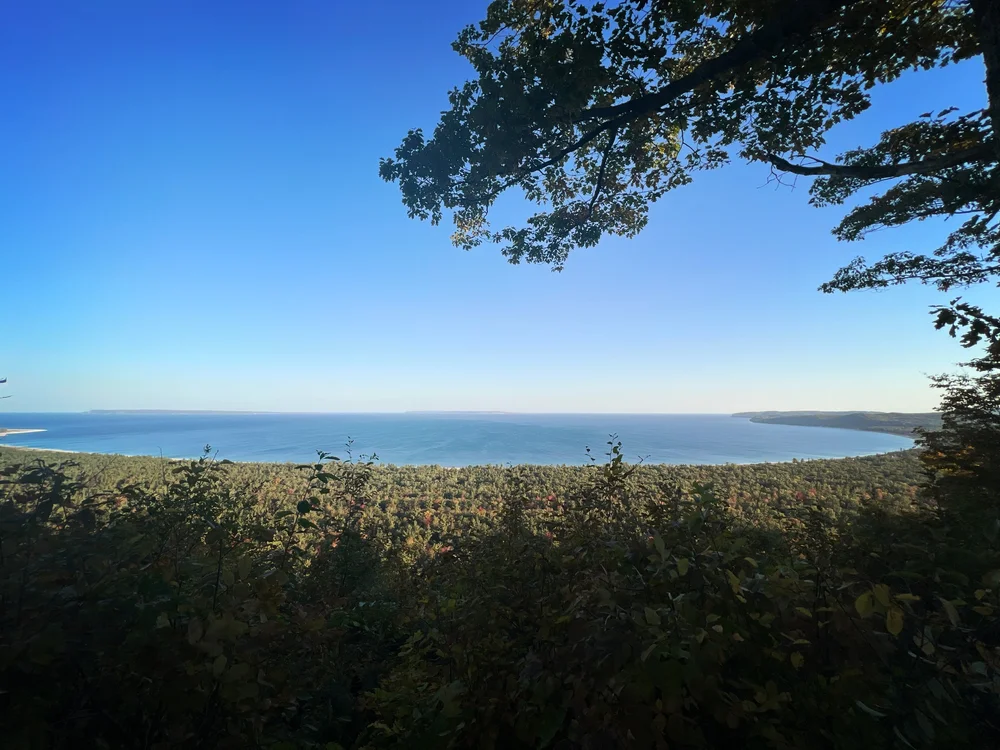The captain and me: a West Bay fishery perspective
By Tim Mulherin
Sun contributor
Excerpted from This Magnetic North: Candid Conversations on a Changing Northern Michigan published by Michigan State University Press and available now at local bookstores.
I met Sam Worden, owner of Showtime Xtreme Charter, in 2019 when I booked his charter out of Grand Traverse West Bay. For years, I wanted to try charter fishing. However, my go-to Up North fishing buddy always talked me out of it, saying there’s no guaranteed catch (understood, after a lifetime of fishing), the weather could be questionable since you must schedule ahead of time (again, understood, that’s fishing), and that it’s expensive (what isn’t; and if it’s worthwhile, who cares). But, despite the well-intended warnings, I decided now that I was in my 60s, I wouldn’t deny myself the experience any longer.
Since then, I’ve been out with Captain Sam, as he’s known, every summer, bringing along several local friends from Cedar, my youngest brother, and once, my 10-year-old grandson, who will drop everything to put a line in the water (runs in the family). When out with Worden, we always catch fish. Always learn excellent fishing tips and about the ecosystem of Grand Traverse Bay and the health of its fishery. And always laugh a lot. I never regret booking a trip with Captain Sam.
This time, I arrange an onboard interview with Worden, 39, given his years of experience not only in the Lake Michigan charter fishing industry, but as an international competitive fisherman who annually travels to Florida, Cabo San Lucas on the Mexican Baja Peninsula, and Costa Rica to try his luck for cash prizes, and does well.
I meet him on Wednesday, June 8, 2022, at 6:15 a.m. at the Elmwood Township Marina. I stand on the dock near his boat, a 27-foot Triton, taking in the sunrise over West Bay. “Doesn’t get any better than this, does it?” says the tall, athletic-looking, baseball-capped charter captain as he quickly preps his fishing tackle for the outing. The harbor is still and lifeless, the many impressive sailboats, yachts, and tugs, having recently arrived, are secured in their berths.
The twin Yamaha 150-horsepower engines idle smoothly as I climb aboard. Captain Sam slips us from the mooring and we’re off, sipping coffee as we enter the bay for a morning of lake trout fishing. Ah, summer in northern Michigan.
The increasing changes to Grand Traverse Bay’s biodiversity are a real concern of Worden’s and give him cause to wonder about the future of the fishery, and in turn, his livelihood, the impact of invasive species the driving force to his unease.
Water clarity continues to improve due to the overwhelming presence of zebra and quagga mussels: we can actually see lake trout in 50 feet of water. Lake bottom vegetation is becoming more common, thanks to the increased sunlight penetration; Worden has seen aquatic plants reaching up 140 feet from the lake floor. Mussels have put a considerable dent in the zooplankton, the primary food source of baitfish. Alewives, which came in from the St. Lawrence Seaway, led to the introduction of salmon in the Great Lakes in the ’60s in an attempt to eradicate that invasive species as well as create a sports fishery.
Worden says that up until recently, baitfish numbers had dropped, so the Michigan Department of Natural Resources reduced salmon stocking because of the diminished food source. However, according to the DNR, alewife biomass is on the rise, so a correlated salmon stocking is on the horizon. It’s a never-ending balancing act, if not an ongoing experiment.
The invasive round gobies have improved the taste of the lake trout. Their reputation as being an oily tasting fish—called “greasers” by old-timers—no longer holds, as the goby has proven to be “like a little protein pill,” Worden says, becoming the bait fish that lake trout prefer over the alewives, thus dramatically improving lake trout’s appeal with his charter customers.
As we chat, he interrupts, “Fish on right here,” notifying me with calm urgency—there’s no better way to explain it—as the rod throbs with life. The line is whining as a lake trout makes a run. When it tires a bit, I lower the rod toward the water and start cranking the reel, then raise it back up, a slow pumping action keeping tension on the fish as it begins to run again. Worden spotted the lake trout in 20 feet of water just after it struck the lure. Because of the ever-improving water clarity, he’s moved to fluorocarbon line, which is less detectable to fish.
Our conversation takes a turn away from fishing. He nods toward the western coast of the bay. The shoreline is lined with houses that weren’t there when he began chartering 20 years ago; many of the ones that were there have been remodeled to three times their original size, he explains. This spring, he helped deliver more than 200 boats to customers from his father’s storage business in Interlochen, and said he occasionally got lost because he “didn’t recognize any of these houses.”
Then Worden pivots to the future—his two children’s, should they stay in the region where their father was raised, his childhood spent living on Long Lake just west of Traverse City. “It does scare me that when my kids grow up, they might not be able to afford living in a place where I grew up and cherish so much; that’s problematic. When is that ever going to slow down?” he says plaintively, adding, “I’ll probably never be able to afford lake property, and that sucks.”
Yet as the Triton motors purr and the water slices away from the hull in a most agreeable, almost musical swishing, Worden shifts his perspective again, noting how few boats are on the water this morning: we count less than a handful. People will continue to come, but “there’s plenty of room,” he believes. Repeating himself from earlier in the morning, as if conjuring the Old Milwaukee Beer commercial in the ’80s, “It doesn’t get any better than this.”
Worden shares another non-fishing tidbit, though Lake Michigan may well indirectly figure into it: “A lot of my high school classmates have gone from here to Chicago, for example. Ninety percent of them now have families and have returned. I don’t think they were really wired for a faster pace.” Captain Sam certainly isn’t. He cuts the motors to a no-wake speed as we enter the harbor then takes a hand from the wheel and waves it in a grand sweeping gesture. “Look at this,” he says in praise of his water wonderland playground, of his good life.
We lift the cooler full of fish he’s about to expertly clean for me and set it on the dock, then we collect the rest of our gear. Worden takes the opportunity to point to the sign on the dashboard of the boat: It shows a banana with a bold red “NO” symbol superimposed on it. He hands me my snack bag, which I never touched, too busy having fun talking with the captain and fishing for lakers. “Man, you made me nervous for the first 10 minutes, but I let it go,” he reveals, smiling ever so slightly, handing me the bag with my banana sticking out of it.
This superstition about bananas being bad luck on a boat dates back hundreds of years. “Oh, man, I won’t let it happen again,” I promise. Captain Sam glances at me, not severely, not unforgivingly, but in a reinforcing kind of way. Then we make our way toward the cleaning station while resuming the easygoing conversation of fishermen. No bananas. Ever. I’ve been warned.
Mulherin will sign copies of This Magnetic North: Candid Conversations on a Changing Northern Michigan on Saturday, June 14, at 1 p.m. at Horizon Books in Traverse City. He will join author talks on Monday, June 16, at 7 p.m. at the Glen Lake Community Library in Empire and Wednesday, June 18, at 5 p.m. at the Leland Township Library.










